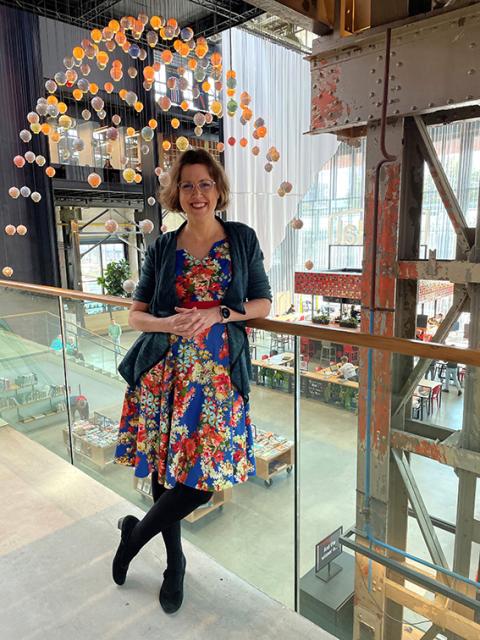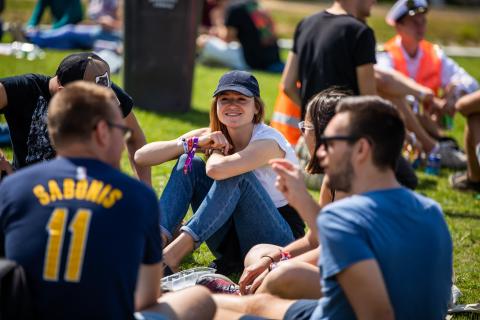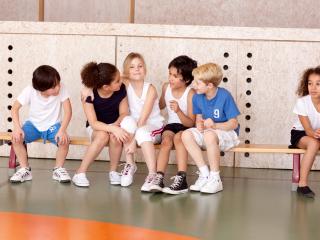Social life after corona: “Picking up the thread will take some getting used to”
Loneliness is widespread in our society and was therefore already high on the social agenda before the corona crisis. Especially in the second wave and during the ensuing lockdown, people experienced more social isolation. Gerine Lodder knows all about it. She has researched the phenomenon of social isolation among young people for years: “It is a misconception that young people are never lonely. Building a social life has many challenges, especially now that many young people have missed eighteen months of normal social exposure. We'll probably have to be a little patient with students in the new academic year.”
That young people have developed certain skills differently over the past year is something to take into account, Gerine Lodder thinks. “It could well be that young people need a little longer to find their feet after a year and a half of stagnation. The combination of social interaction with academic activities and attending lectures can take some getting used to.”
Drunken dorm parties
Where some young people go all out at parties, others get stuck with feelings of loneliness. “Youngsters react in different ways,” Gerine Lodder observes. “In general, your college years are pre-eminently the time when you build an independent life. You expand your network and learn new habits of planning and organizing all kinds of tasks and interacting with different people. This usually is a natural process: you meet people on campus, at student associations, or in the pub - even drunken dorm parties can contribute to social development. Corona put a stop to that. To teach yourself new habits and skills after such a relatively long time, there is a lot of catching up to do, and that takes time. This is especially true for young people for whom striking up friendships is a challenge in itself.”
To teach yourself new habits and skills after such a relatively long time, there is a lot of catching up to do, and that takes time.
Resilience
Without opportunities, the automatic nudges, it was difficult for many young people to make contact and stay in touch during the lockdowns. “Although we don’t have all the results yet, it appears that the second lockdown had a stronger effect on loneliness than the first,” Gerine Lodder says. “There has always been a lot of difference in the extent to which people need contact and in the strategies they use to meet that need, also before corona. But we do see that the mental advantage that extroverts normally have has been eliminated by the lockdown. So in a sense, we were all in the same boat.” Lodder does expect differences in the way in which people will be getting back to normal: “Resilience and flexibility probably play an important role.”

We do see that the mental advantage that extroverts normally have has been eliminated by the lockdown. So in a sense, we were all in the same boat. I expect differences in the way in which people will be getting back to normal: Resilience and flexibility probably play an important role
- Gerine Lodder
Contact initiëren
This is a familiar picture for students at Tilburg University, student psychologists Margreet van Laarhoven, Annelies Aquarius and Jos Haarbosch say: “We regularly talk to students who miss the social interaction or who have only a very limited social network. International students, for instance, and other students who are new to Tilburg and live in digs or in small communities. They haven’t had an opportunity to build a network. Some of them have never even been to the campus before. We also recognize that questions about loneliness have increased during the second lockdown."
On Campus
Students also miss the spontaneous interaction about their studies; the chat at the coffee machine or running into fellow students at the door of the lecture hall and sharing the fact that the subject matter or the next exam are really tough. Such casual chats put their worries into perspective: it is reassuring if peers are clearly struggling with the same issues. These students need contact, but do not know where to start or are afraid to take the first step. We tell them that they aren’t the only ones. Together with the student, we identify opportunities for contact and how the student can initiate contact without too much risk of the plan backfiring.”
Many students feel the need for contact, but they don't know how to initiate it or are afraid to take the first step. We ensure them they are not alone.
- Annelies Aquarius, Jos Haarbosch, Margreet van Laarhoven

Personal
Since the corona crisis, the theme of social isolation has been higher on the agenda of the Ministry of Health, Welfare and Sport and the municipalities. It has become easier to talk about and all kinds of initiatives have been created to combat feelings of loneliness and to facilitate social contact. “Of course it is very personal what works or doesn’t work for you,” Gerine Lodder states. “It's good to consciously reflect on this: what does it mean to you to be lonely? What exactly is missing in your life? What do you think you can do about it? For some, a night out to a pop concert would offer relief, others benefit from more in-depth support.”

Thirst
“For anyone who feels lonely it is good to know that it is very common among all age groups. And also that it is a useful feeling: your body gives a signal that you are lacking something. Just like being thirsty”, concludes Gerine Lodder. “An important tip is talk about it! That helps.
"There is also good news: research shows that when you actively work on your social health, it actually works. In many cases - in the long run - improvement occurs. So hold on. Find out what loneliness means to you personally. Experiment with different forms of help and social networks. That way you find out what makes you feel better. Finally, it is important that you seek help from your GP or psychologist if you experience prolonged feelings of loneliness.”
The student psychologists’ tips
- We have created a webpage to help students get through the period of online education in a good way. How do I keep motivated for my studies? Social interaction plays an important role.
- If natural contacts like housemates, a WhatsApp group with fellow students or other members of the study association are not an option, there are various initiatives like TiU Walks, the offer of Meet Ups and the activities and extra contact options via the Maranatha Student Chaplaincy.
Do you need help urgently? Here’s a list of initiatives to combat social isolation
- Avondje uit 013 (Night out in 013, in Dutch): leisure activities aimed at establishing long-term social contact for young people between 16 and 35 years of age.
- Do you need help or a sympathetic ear? Call 0800 - 1322.
- Ease.nl, chatting with peers and experts-by-experience or dropping in in the Amsterdam or Heerlen/Maastricht area, anonymously and free of charge.
- Alles oké? (Everything OK?) offers support to everyone aged between 18 and 24 if things aren’t going so great. Free of charge and anonymous chats and calls.
- On YouTube, you can find various music videos to help you relax or fall asleep.
Gerine Lodder and Margreet van Laarhoven created this video about loneliness and what you can do about it for Tilburg University students. Based on the video, students could send in their questions about this topic.
Date of publication: 4 October 2021



